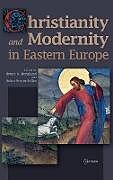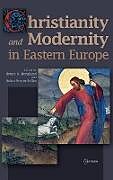Christianity and Modernity in Eastern Europe
Einband:
Fester Einband
EAN:
9789639776654
Untertitel:
Englisch
Genre:
Geschichte
Autor:
Bruce R. Porter-Szucs, Brian Berglund
Herausgeber:
CEU Educational-Service Non-profit LLC
Anzahl Seiten:
402
Erscheinungsdatum:
10.05.2010
ISBN:
978-963-9776-65-4
Informationen zum Autor Bruce Berglund is Professor of History and Director of the Honors Program at Calvin College. Brian Porter-Szucs is Associate Professor of History at the University of Michigan. Klappentext Religious history more generally has experienced an exciting revival over the past few years, with new methodological and theoretical approaches invigorating the field. The time has definitely come for this "new religious history" to arrive in Eastern Europe. This book explores the influence of the Christian churches in Eastern Europe's social, cultural, and political history. Drawing upon archival sources, the work fills a vacuum as few scholars have systematically explored the history of Christianity in the region.The result of a three-year project, this collective work challenges readers with questions like: Is secularization a useful concept in understanding the long-term dynamics of religiosity in Eastern Europe? Is the picture of oppression and resistance an accurate way to characterize religious life under communism, or did Christians and communists find ways to co-exist on the local level prior to 1989? And what role did Christians actually play in dissident movements under communism? Perhaps most important is the question: what does the study of Eastern Europe contribute to the broader study of modern Christian history, and what can we learn from the interpretative problems that arise, uniquely, from this region? Inhaltsverzeichnis Introduction: Christianity! Christians! and the Story of Modernity in Eastern Europe Chapter 1 Religion in Urban Everyday Life: Shaping Modernity in Lodz and Manchester 1820-1914 Chapter 2 Christianity! Nation! State: The Case of Christian Hungary Chapter 3 Searching for a 'Fourth Path': Czech Catholicism between Liberalism! Communism! and Nazism.A" Chapter 4 The Roman Catholic Church Navigates the New Slovakia! 1945-1948 Chapter 5 Bulwark or Patchwork? Religious Exceptionalism and Regional Diversity in Postwar Poland Chapter 6 Competing Concepts of 'Reunification' behind the Liquidation of the Ukrainian Greek Catholic Church Chapter 7 From Bottom to the Top and Back: On How to Build a Church in Communist Romania Chapter 8 Human Rights as a Theological and Political Controversy among East German and Czech Protestants Chapter 9 State Management of the Seer Vanga: Power! Medicine! and the 'Remaking' of Religion in Socialist Bulgaria Chapter 10 Constructing Peace in the GDR: Conscientious Objection and Compromise Among East German Christians! 1962-1989 Chapter 11 On the Ruin of Christendom: Religious Politics and the Challenge of Islam in the New West Chapter 12 Drafting a Historical Geography of East European Christianity List of Contributors Index Bibliography ...
Klappentext
Religious history more generally has experienced an exciting revival over the past few years, with new methodological and theoretical approaches invigorating the field. The time has definitely come for this "new religious history" to arrive in Eastern Europe. This book explores the influence of the Christian churches in Eastern Europe's social, cultural, and political history. Drawing upon archival sources, the work fills a vacuum as few scholars have systematically explored the history of Christianity in the region.The result of a three-year project, this collective work challenges readers with questions like: Is secularization a useful concept in understanding the long-term dynamics of religiosity in Eastern Europe? Is the picture of oppression and resistance an accurate way to characterize religious life under communism, or did Christians and communists find ways to co-exist on the local level prior to 1989? And what role did Christians actually play in dissident movements under communism? Perhaps most important is the question: what does the study of Eastern Europe contribute to the broader study of modern Christian history, and what can we learn from the interpretative problems that arise, uniquely, from this region?
Inhalt
Introduction: Christianity, Christians, and the Story of Modernity in Eastern Europe Chapter 1 Religion in Urban Everyday Life: Shaping Modernity in Łodź and Manchester 1820-1914 Chapter 2 Christianity, Nation, State: The Case of Christian Hungary Chapter 3 Searching for a 'Fourth Path': Czech Catholicism between Liberalism, Communism, and Nazism.A" Chapter 4 The Roman Catholic Church Navigates the New Slovakia, 1945-1948 Chapter 5 Bulwark or Patchwork? Religious Exceptionalism and Regional Diversity in Postwar Poland Chapter 6 Competing Concepts of 'Reunification' behind the Liquidation of the Ukrainian Greek Catholic Church Chapter 7 From Bottom to the Top and Back: On How to Build a Church in Communist Romania Chapter 8 Human Rights as a Theological and Political Controversy among East German and Czech Protestants Chapter 9 State Management of the Seer Vanga: Power, Medicine, and the 'Remaking' of Religion in Socialist Bulgaria Chapter 10 Constructing Peace in the GDR: Conscientious Objection and Compromise Among East German Christians, 1962-1989 Chapter 11 On the Ruin of Christendom: Religious Politics and the Challenge of Islam in the New West Chapter 12 Drafting a Historical Geography of East European Christianity List of Contributors Index Bibliography

Leider konnten wir für diesen Artikel keine Preise ermitteln ...
billigbuch.ch sucht jetzt für Sie die besten Angebote ...
Die aktuellen Verkaufspreise von 6 Onlineshops werden in Realtime abgefragt.
Sie können das gewünschte Produkt anschliessend direkt beim Anbieter Ihrer Wahl bestellen.
Loading...
Die aktuellen Verkaufspreise von 6 Onlineshops werden in Realtime abgefragt.
Sie können das gewünschte Produkt anschliessend direkt beim Anbieter Ihrer Wahl bestellen.
| # | Onlineshop | Preis CHF | Versand CHF | Total CHF | ||
|---|---|---|---|---|---|---|
| 1 | Seller | 0.00 | 0.00 | 0.00 |
